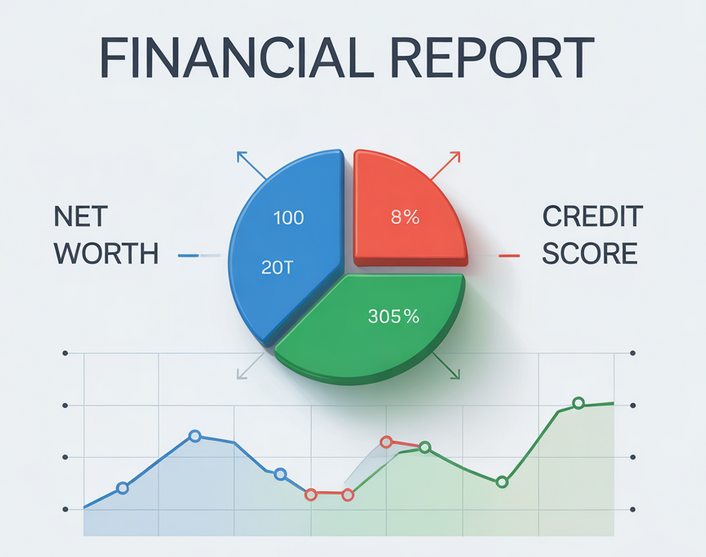While they represent different aspects of your finances, together they provide a snapshot of your overall financial well-being and your ability to achieve both short-term goals and long-term financial stability.
What is Net Worth?
Net worth is a simple yet powerful concept. It is the value of everything you own (assets) minus everything you owe (liabilities). The formula is:
Net Worth = Total Assets – Total Liabilities
Your assets include things like:
- Cash and savings accounts
- Investments (stocks, bonds, retirement accounts)
- Real estate (homes, land)
- Personal property (cars, jewelry, valuable collectibles)
Your liabilities include:
- Credit card balances
- Student loans
- Mortgages
- Car loans
- Any other personal debt
Example: Let’s say Sarah owns a house worth $250,000, has $20,000 in a 401(k), and $10,000 in savings. Her total assets are $280,000. If she owes $200,000 on her mortgage and $10,000 in credit card debt, her total liabilities are $210,000. So:
Sarah's Net Worth = $280,000 – $210,000 = $70,000
Why Net Worth Matters
Net worth provides a clear, single-number view of your financial position. It helps answer questions like:
- Am I building wealth or losing ground?
- Do my assets exceed my debts?
- Can I afford to take on more debt?
It’s particularly useful for long-term financial planning. Watching your net worth grow over time gives you confidence that you’re on the right track—whether toward retirement, home ownership, or debt freedom. It also helps you detect potential financial trouble early if your liabilities start to outweigh your assets.
What is a Credit Score?
Your credit score is a three-digit number that reflects how well you’ve managed borrowed money. It is calculated based on your credit history and reported by the major credit bureaus (Equifax, Experian, and TransUnion).
Credit scores typically range from 300 to 850:
- Excellent (800+)
- Very Good (740–799)
- Good (670–739)
- Fair (580–669)
- Poor (below 580)
Scores are calculated using factors like:
- Payment history (35%) – Do you pay your bills on time?
- Credit utilization (30%) – Are you using too much of your available credit?
- Length of credit history (15%)
- Credit mix (10%)
- New credit inquiries (10%)
Why Credit Score Matters
Your credit score affects your ability to borrow money, and the interest rates you’ll pay on loans or credit cards. A high score means lenders see you as low risk, so you may qualify for lower interest rates and better loan terms.
Example: John and Lisa both apply for a $200,000 mortgage. John has a credit score of 780, and Lisa has a score of 620. John's interest rate might be 4%, while Lisa’s could be 6%. Over a 30-year mortgage, Lisa would pay tens of thousands more in interest simply because of a lower credit score.
It also affects:
- Renting an apartment
- Getting a mobile phone plan
- Applying for insurance
- Even job opportunities (in some industries)
Net Worth vs. Credit Score: What’s the Difference?
- Net worth measures how much you have.
- Credit score measures how well you manage debt.
You can have a high net worth and a poor credit score, or a low net worth and a great credit score. Ideally, you want both to be strong.
Final Thoughts
Understanding and monitoring your net worth and credit score are key habits for smart financial management. Regularly tracking these numbers helps you set realistic goals, make informed decisions, and stay financially healthy.
If you haven’t already, calculate your net worth today and check your credit score through a free credit monitoring service. Knowing where you stand is the first step toward where you want to go.








